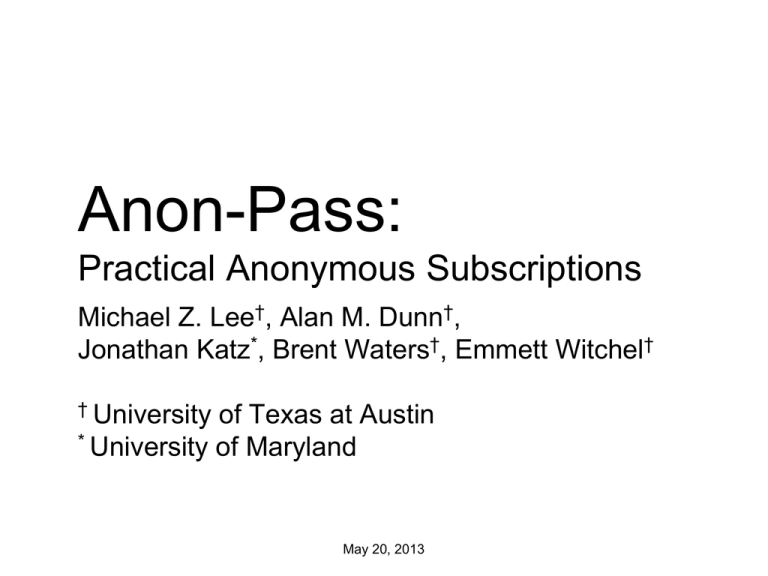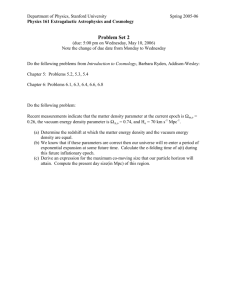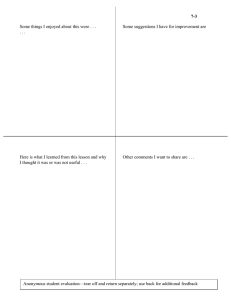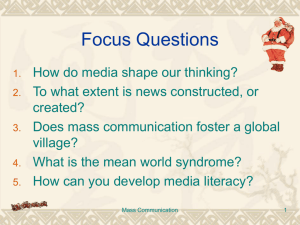Anon-Pass: Practical Anonymous Subscriptions
advertisement

Anon-Pass: Practical Anonymous Subscriptions Michael Z. Lee†, Alan M. Dunn†, Jonathan Katz*, Brent Waters†, Emmett Witchel† † University of Texas at Austin * University of Maryland May 20, 2013 Media Subscriptions Unlimited access subscriptions -2- Let’s build a service X 1234… 1234… ♫♪♩♬ ♫♪♫♩♪♩ 2345… Sharing Resistance (admission control) -3- They are collecting information about you. -4- Anonymous Media Accesses can’t be correlated Song 2 Song 1 time 1234… 8720… Unlinkability -5- Linked accesses could deanonymize users Access patterns for enough time could help deanonymize clients The Netflix Prize dataset [Narayanan, Shmatikov 2008] Social networks [Narayanan, Shmatikov 2009] -6- But even if tokens are unlinkable… 1234… 141.212.15.125 128.83.122.105 ♫♪♩♬ 8720… 128.83.122.105 37.130.227.133 We assume clients are using a network anonymity service -7- Anonymous Music Service Straw Man 1234… ♫♪♩♬ 8720… 7964… 8739… 1910… Unlinkability 2372… but not sharing resistance 3141… -8- How do we get both? Unlinkable Serial Transactions [Syverson et al. 19 Sharing resistance, unlinkability but needs unbounded storage Anonymous Blacklisting Systems [Tsang et al. 200 Sharing resistance, unlinkability but computationally expensive -9- And also be practical? Unlinkable Serial Transactions [Syverson et al. 19 Sharing resistance, unlinkability but needs unbounded storage Anonymous Blacklisting Systems [Tsang et al. 200 Sharing resistance, unlinkability but computationally expensive Anon-Pass Sharing resistance, unlinkability, and efficien Example: over 12,000 concurrent clients -10- How? How is Anon-Pass built? How is Anon-Pass used? How does Anon-Pass perform? -11- How is it built? Split up time into epochs Each user has a unique token for an epoch t–1 t t+1 t+2 time 1234… Each epoch allows a new, unpredictable token -12- How is it built? Split up time into epochs Each user has a unique token for an epoch t–1 t t+1 t+2 time 1234… <- PRF (t) Each epoch allows a new, unpredictable token Use a pseudorandom function (PRF) -13- High Level Protocols Register Get a blinded signature on a secret Login Prove the token used the signed secret (in zero knowledge) -14- Anonymous Music Service Song 1 t–1 t t+1 Song 2 t+2 time 1234… 8720… PRF (t) PRF (t+2) -15- Anonymous Music Service But songs don’t always fit in one epoch Song 1 t–1 t t+1 t+2 time PRF (t+2) (t) 1234… 5629… 8720… (t+1) -16- Anonymous Music Service But songs don’t always fit in one epoch And these accesses are implicitly linked t–1 t t+1 t+2 time 1234… 5629… 8720… Conditional Linkability -17- Accesses can be implicitly linked Baby+ 0s The service knows when the Baby+15ssame song is repeatedly accessed Baby+30s Baby+45s Client is implicitly linked Baby+60s while accessing the same media Baby+75s Baby+90s And unlinkability costs …. the service provider (and therefore harms the system) -18- Re-Up Our way of getting conditional linkability Prove the current token and the next token are linked Trades unlinkability for efficiency But the client already lost unlinkability while accessing the same media -19- Re-Up is more efficient Login proves you should be allowed access Re-Up proves you logged in before Login takes 10 expensive operations Re-Up takes only 2 -20- Using Login and ReUp A client must Login to start a new song And Re-Up to continue playing the same song t–1 t t+1 t+2 time Re-Up Re-Up To be unlinkable again, the client must wait until the next epoch -21- Epoch Lengths: Long vs. Short A short epoch means less time to be unlinkable And less delay between client actions Happy Clients A long epoch means fewer client requests And lower server load Happy Server Choosing an epoch length depends on the service (e.g., 15 seconds for music, 5 minutes for movies) -22- Re-Up helps balance this tension Short epochs means less wait between unlinkable actions Re-Up instead of Login reduces server load -23- And Anon-Pass is formally proven Formal proof of security holds under the DDHI assumption Formal proof of soundness holds under the LRSW assumption Stated and proved in the paper -24- How? How is Anon-Pass built? How is Anon-Pass used? How does Anon-Pass perform? -25- How could it be used? Anonymous Music Streaming Music download over normal HTTP 15 second epoch Unlimited-use Subway Pass NYC’s “unlimited” pass 6 minute epoch Account Proxy Multiplex accounts to news sites 1 minute epoch -26- System Architecture my laptop subscription service ♪ Application Server Client Application -27- System Architecture my laptop subscription service ♪ Application Server Client Application Authentication Server User Agent -28- System Architecture my laptop Client Application User Agent subscription service Gatewa y Authentication Server -29- ♪ Application Server rd 3 party service User Agent Purpose: minimize changes to client applications Job: Create Login and Re-Up requests Keep the user secret secure Modified VLC to anonymously stream (54 LoC) No modifications to support browsers -30- Authentication Server Purpose: enforce sharing resistance Job: Verify tokens and token uniqueness Record active tokens Runs on the service or as a 3rd party -31- Gateway Purpose: enforce access control with minimal cha to existing services Job: Prevent unauthorized access and responses Remove verification from the critical path Runs on the service as a front end server -32- How? How is Anon-Pass built? How is Anon-Pass used? How does Anon-Pass perform? -33- Evaluation Environment quad-core 2.66 GHz Intel Core 2 CPU 8GB RAM 1 Gbps network 10 client machine to evaluate the streaming music service An HTC Evo 3D to evaluate the anonymous subway pass -34- milliseconds Crypto Cost 10 9 8 7 6 5 4 3 2 1 0 Other 7.8x Faster Login Re-up -35- Verify Music Service Scaling HTTP server to stream music 15 second epoch Add clients until we run out of resources Used 10 client machines -36- Music Service Scaling Login Only vs. Anon-Pass Steady % CPU 8,000 Clients Login Only 12,000 Clients Anon-Pass Time -37- Anonymous Subway Pass Problem: Need to rate limit between swipes A long epoch can simulate that timeout But sharing is still possible… t t+1 -38- Anonymous Subway Pass Solution: Login and Re-Up at the same time Accesses during later epochs are linkable t–1 t t+1 t+2 time X -39- Anonymous Subway Pass Implemented as an Android application Clients Login and Re-Up twice (18 minute NYC policy) Takes only 0.2 seconds (on an HTC Evo 3D) -40- Anon-Pass Practical – efficient enough to scale Flexible – works with different services Deployable – minimizes service changes -41- -42-



